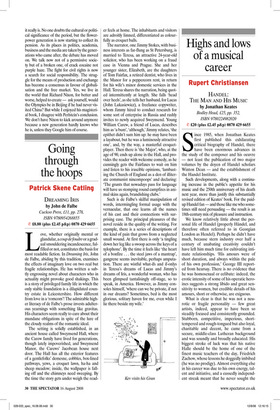Going through the hoops
Patrick Skene Catling
DREAMING IRIS by John de Falbe Cuckoo Press, £11, pp. 278, ISBN 9780954268855 ✆ £8.80 (plus £2.45 p&p) 0870 429 6655 Love, whether originally mental or glandular, a coup de foudre or a gradual smouldering incandescence, fulfilled or not, constitutes the basis for most readable fiction. In Dreaming Iris, John de Falbe, abiding by this tradition, examines the effects of imaginary love on two real but fragile relationships. He has written a subtly engrossing novel about characters who in actuality might provoke good shakings. This is a story of privileged family life in which the only stable foundation is a dilapidated country estate in Leicestershire. How different from love in a ‘romcom’! The admirable higher literacy of de Falbe’s prose invests adulterous yearnings with something like gravitas. His characters seem really to care about their mundane obligations in spite of the lure of the cloudy realms of the romantic ideal.
The setting is solidly established, in an ancient house called Sweynsend Hall, where the Carew family have lived for generations, though lately impoverished, and Sweynsend Manor, the Carews’ Jacobean house next door. The Hall has all the exterior features of a gentlefolks’ demesne, cobbles, box-lined pathways, yews, a croquet lawn, ha-ha and sheep meadow; inside, the wallpaper is falling off and the chimneys need sweeping. By the time the story gets under weigh the read er feels at home. The inhabitants and visitors are adroitly limned, differentiated as colourfully as croquet balls.
The narrator, one Jimmy Stokes, with business interests as far-flung as St Petersburg, is married to Teresa, an attractive 24-year-old solicitor, who has been working on a fraud case in Vienna and Prague. She and her younger sister, Elizabeth, are the daughters of Tom Fairfax, a retired dentist, who lives in the Manor for a peppercorn rent, in return for his wife’s minor domestic services in the Hall. Teresa shares the narration, being quoted intermittently at length. She falls ‘head over heels’, as she tells her husband, for Lucas (John Lukasiewicz), a freelance copywriter, whom Jimmy hired to conduct research for some sort of enterprise in Russia and rashly invites to newly acquired Sweynsend. Young William Carew, a friend of Lucas, describes him as ‘a bum’, ‘although,’ Jimmy relates, ‘the epithet didn’t sum him up: he may have been a layabout, but he was a luminously attractive one’, and, by the way, a masterful croquetplayer. Then there is ‘the Major’, who, at the age of 90, ends up alone in the Hall, and provides the reader with welcome comedy, as he cunningly gets the Fairfaxes to wait on him and listen to his irascible opinions, ‘lambasting the Church of England as a den of illiterate communist nincompoops’ and declaring: ‘The grunts that nowadays pass for language will have us stomping round campfires in animal skins again, brandishing clubs.’ Such is de Falbe’s skilful manipulation of words, intermingling formal usage with the vernacular, that one learns all the names of his cast and their connections with surprising ease. The principal pleasures of the novel reside in the quality of the writing. For example, there is a series of descriptions of the kind of pain that grows from a neglected small wound. At first there is only ‘a tingling down her leg like a swoop across the keys of a xylophone’. By the time it feels like ‘the heart of a bonfire . . . the steel jaws of a mantrap’, gangrene seems inevitable, perhaps amputation. There are wistful what-ifs and if-onlys in Teresa’s dreams of Lucas and Jimmy’s dreams of Iris, a wonderful woman, who has been glimpsed tantalisingly off-stage, so to speak, in America. However, as Jimmy consoles himself, ‘where can we be private, if not in our dreams? Sometimes, bed is the most glorious, solitary haven for me, even while I lie there beside my wife.’


























































 Previous page
Previous page